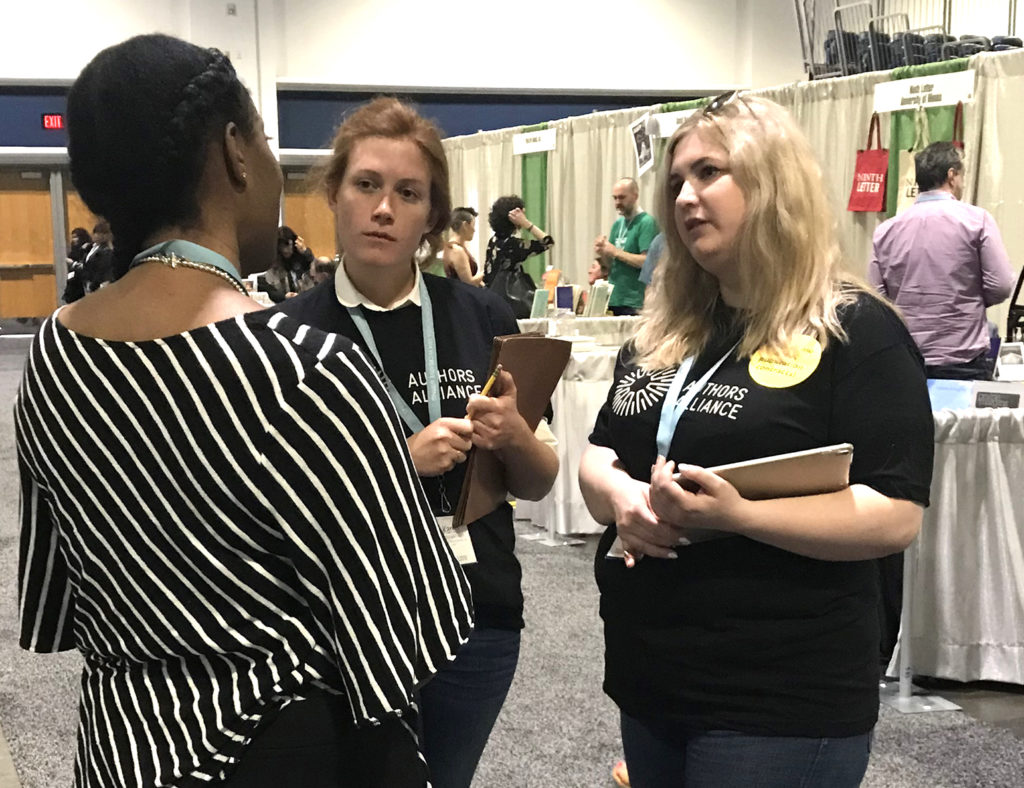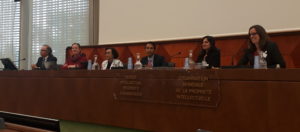We at Authors Alliance are hard at work on a new guide to Understanding Book Publication Contracts, the fourth volume in our series of educational handbooks that will empower authors to make savvy decisions when negotiating their contracts.
Work on the guide is going smoothly, and it would not have been possible without two standout members of the Samuelson Law, Technology, & Public Policy Clinic at the UC Berkeley School of Law: Karen Hagen and Anna Kuksenkova. Karen and Anna were instrumental in gathering information from authors through surveys and interviews, and they contributed substantially to drafting sections of the guide. We recently turned the tables and interviewed them to learn more about their experience with the project and about their plans now that they are newly-minted JDs.

Karen and Anna interview an author at the AWP conference in March 2018
Authors Alliance: There are lots of opportunities to take on a variety of projects in law school. Why did you decide to work on the Guide to Book Publication Contracts?
Anna Kuksenkova: I’ve always been a huge bookworm. I enjoy sci-fi and fantasy especially, and have even thought about writing my own novel someday. As a law student, my focus and interest is in intellectual property law, specifically copyright. This was such a neat opportunity to work across both these interests.
Karen Hagen: First of all, because I love to read. Hopefully, the Guide will make negotiating publication contracts for authors easier and less scary so that they have more time for writing great books that I, in turn, will read. Furthermore, I loved the challenge of writing for a non-legal audience for a change.
AuAll: What was your favorite part about working on the Guide?
KH: The interviews with the authors! They made our work on the guide meaningful and a lot of fun.
AK: Speaking to real authors! I got to interview some people I’d already heard of and admired, and others I’d never heard of that I was so excited to have a chance to meet. I’m really glad we were able to talk directly to the audience we were writing the book for and tailor our advice to what they wanted and needed in a guide like this. Plus I couldn’t believe some of their stories!
AuAll: Tell us about a key point and/or something surprising that you learned.
KH: A lot of authors believe they don’t have to know about contracts if they have an agent. Of course, having an agent can take a huge load of your shoulders, but how can you as an author discuss with our tell your agent what to negotiate for if you have no idea what publication contracts are all about?
AK: I think a lot of the authors we spoke to cared about their copyright in the book but didn’t have a good idea of what that means in practice. Sometimes, publishers will ask for all the rights to a work, but register the copyright in the author’s name and put the © on the first page next to the author’s name. But that’s not really retaining your copyright, because you’ve still signed away your exclusive rights: the right to copy, distribute, create adaptations, etc. That’s what copyright really is.
AuAll: If you had just one takeaway for authors based on your work, what would it be?
AK: Don’t be afraid to ask! For every time we’ve heard “you’ll never get X,” even from editors, we had another example of someone who HAD gotten X. I’ve never heard of anyone losing a book deal because they merely asked politely to change a term. If you’re sitting at that table, they already want you. It may not feel like you have a lot of power, but you have more than you think.
KH: A lot of the time, the people you’ll negotiate with as an author haven’t really gotten the ins and outs of publication contracts themselves. So simply being knowledgeable about contracts is a big advantage.
AuAll: Now that you’ve graduated, what are your future career plans?
KH: Before eventually moving back to Germany and working as an IP lawyer, I will intern at a Silicon Valley law firm working on technology transactions.
AK: I’m currently studying for the California bar exam and looking for a work opportunity, here or in D.C. I’m excited to see where I go next.
AuAll: Tell us a little something about yourself: What do you love to do when you’re not working on legal issues? Favorite things about Berkeley and the Bay Area? What’s the first thing you’re going to do after taking the bar exam?
AK: When I’m not working, I love quiet evenings in, cuddling with my cat, reading or watching movies. Sometimes I do collaborative writing with my friends back on the east coast, short stories and coda to comics and TV, things like that. I’ve also been showing my grandma, who I invited to come live with me for a little while, around the east bay. I love how much diversity there is here, not only people, but in access to different cultures, too. We’re Russian and she recently emigrated here, and I’ve found so many resources in this area for her, an adult ESL program and Russian community. I just think the culture here is great, even if the traffic and cost of housing are tough to swallow.
The second I’m done with the bar exam I’m heading south to the nearest warm, sunny beach. I think I’m just going to nap there for a week straight!
KH: I love to explore and travel. One of my favorite places in the Bay Area, particularly in the spring, is Point Reyes. Every time I went I saw amazing wildlife: otters, coyotes, barn owls, deer, elk, and whales. Other than that, I love to read. That’s why the first thing I’ll certainly do after taking the bar exam is dive into a page-turning novel. I already have one in mind that one of our interviewees recommended!
In case you haven’t heard, we have launched “Know Before You Sign on the Dotted Line,” a Kickstarter campaign to help fund the production of the Guide to Book Publication Contracts. As of today, we’re almost 75% of the way to our goal, so if you haven’t pledged yet, please do so before the campaign ends on June 15!




 Recent developments in the entertainment industry, notably the #MeToo movement, have led the entire country to focus more on questions of ethics and morality in business, educational, and media settings. The publishing industry, too, has been rocked by story after story of inappropriate behavior by big-name authors, including —to the great disappointment of many—a number of children’s authors. The Society of Children’s Book Writers and Illustrators earlier this year released an
Recent developments in the entertainment industry, notably the #MeToo movement, have led the entire country to focus more on questions of ethics and morality in business, educational, and media settings. The publishing industry, too, has been rocked by story after story of inappropriate behavior by big-name authors, including —to the great disappointment of many—a number of children’s authors. The Society of Children’s Book Writers and Illustrators earlier this year released an 



